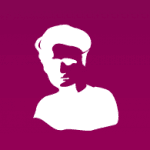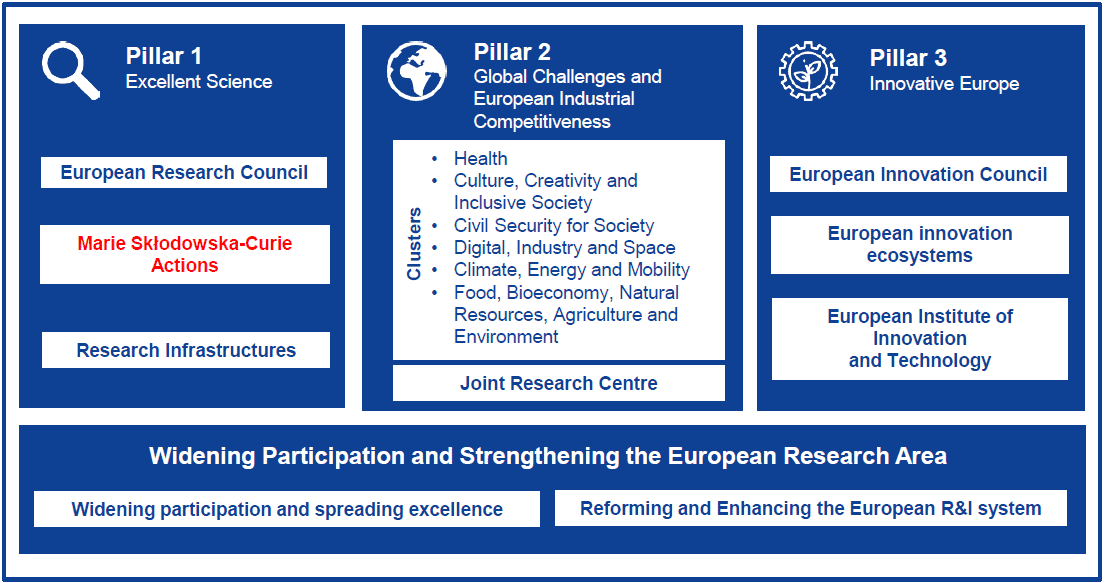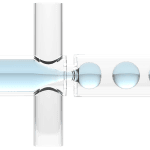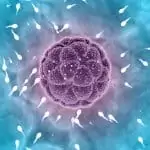MSCA (IF, ITN, RISE…): Novelties under Horizon Europe
Author
Christa Ivanova, PhD
Publication Date
May 14, 2021
Keywords
Horizon 2020 vs Horizon Europe
MSCA sub-actions
Doctoral Networks
Postdoctoral Fellowships
Staff Exchanges
Marie-Curie Actions 2021-2027
Your microfluidic SME partner for Horizon Europe
We take care of microfluidic engineering, work on valorization and optimize the proposal with you
The Marie Sklodowska-Curie Actions (MSCA) are evolving under Horizon Europe. Here, we present the major novelties under Horizon Europe together with the updated call deadlines.

In January 2021, the H2020 European funding program gave way to the new program Horizon Europe (2021-2027).
Horizon Europe is divided into three pillars, the first still dedicated to Excellent Science, with a budget of around €25 billion.
Marie Sklodovska-Curie Actions will continue under this pillar to promote the mobility of researchers, provide high-quality training to enhance the career perspectives of young researchers and facilitate international, interdisciplinary, and intersectoral collaborations.

Comparison of MSCA (ITN, IF, RISE) programs under H2020 and Horizon Europe
Most of the changes under Horizon Europe have the objective to simplify the grant application procedure. The following table summarizes the main differences and common points of MSCA under H2020 vs. Horizon Europe.
|
H2020
|
Horizon Europe
|
|---|---|
|
ITN (Innovative Training Networks)
|
Doctoral networks (MSCA-DN)
|
|
• 3 types of ITN: ETN, EID, EJD
|
• Only 1 type (industrial doctorates or joint doctorate)
|
|
• Enrollement in PhD programme not mandatory for ETN
|
• Enrollement in PhD programme mandatory for every student
|
|
• Max 15 PhD students/ consortium
|
• Max 10 PhD students/ consortium (except of an industrial or a joint doctorate)
|
|
4 years
|
|
|
To develop transferable skills and open career perspectives
|
|
|
Candidates must have spent less than 12 months in the host country in the past 3 years
|
|
|
Public/ private collaboration strongly encouraged
|
|
|
IF (Individual fellowships)
|
Postdoctoral fellowships (MSCA-PF)
|
|
• 4 types of European Fellowship (ST, CAR, RI and SE) + Global Fellowship
|
• Only 1 type of European Fellowship + Global Fellowship
|
|
• <12 months in host country in past 3 years OR <36m in past 5y
|
• <12 months in host country in past 3 years
|
|
• Duration 12 to 24 months
|
• 12 - 24 months + 6 months in non academic sector if post-doc is done in academia
|
|
To reinforce post-doctoral fellows’ skills and enhance career perspective
|
|
|
For experienced researchers
|
|
|
RISE (Research and Innovation Staff Exchanges)
|
Staff Exchanges (MSCA-SE)
|
|
• Consortium has to be intersectoral (academia and industry)
|
• Consortia from a single sector allowed if interdisciplinary
|
|
• To promote international and intersectoral collaboration
|
• To promote international, interdisciplinary and intersectoral collaboration
|
|
Max. 4 years
|
|
|
At least 3 partners from 3 different countries
|
|
|
To promote collaboration with third countries
|
|
|
COFUND
|
MSCA-COFUND
|
|
• Possible to participate several times, without any restriction
|
• To promote the participation of new institutions
|
|
• 2 types: doctoral and post-doctoral
|
• Only one type of COFUND
|
|
5 years
|
|
|
European Researcher Night
|
MSCA and Citizens (MSCA-NIGHT)
|
|
Research dissemination
|
|
MSCA call deadlines Horizon Europe

The MIC and Horizon Europe
Did you know innovation is at the heart of the Horizon Europe program? Collaborate with us for your MSCA project (ITN, IF, RISE…) and strengthen your Horizon Europe consortium!
Our last news:
We will be glad to participate in your project. Visit our dedicated webpage to learn more about our expertise as H2020 and Horizon Europe partner!
Curious about the calls currently open?
We are particularly interested in the following calls but remain open to collaboration!
- EIC WORK PROGRAMME that supports all stages from R&D to industry for game-changing innovations
- HORIZON EUROPE RIA CALLS, specifically focusing on health and food, bioeconomy, natural resources, agriculture, and environment
Some of our funded MSCA projects:
MSCA-IF

Automated high-throughput production of monodisperse emulsions with microfluidics
Check the Horizon Europe tips and tricks
FAQ - MSCA (IF, ITN, RISE...): Novelties under Horizon Europe
- What exactly was different in the case of MSCA between Horizon 2020 and Horizon Europe?
ITN was renamed Doctoral Networks (MSCA-DN), IF Postdoctoral Fellowships (MSCA-PF) and RISE Staff Exchanges (MSCA-SE). COFUND and MSCA & Citizens proceed with simplified regulations. The overall goal, mobility and high-quality training, stays, and intersectoral exposure, open science, and more precise impact pathways have more emphasis.
- ITN / vs. Doctoral Networks: what are the actual differences?
Doctoral enrolment was no longer optional (as required by ETN in H2020), but compulsory to all recruited researchers under MSCA-DN. Deadlines for Consortia with a potential to fund up to 15 doctoral researchers under H2020 have been limited by default (10 per consortium) to Industrial Doctorates or Joint Doctorates. Transferable skills and secondments should be incorporated into training plans rather than listed freely; the evaluators seek a logical training structure.
- What changed in Postdoctoral Fellowships (IF-PF)?
To it there were a number of European IF flavours (ST, CAR, RI, SE) and a Global scheme. Under Horizon Europe, European PF is amalgamated into one scheme (as well as Global), retained the mobility rule (less than 12 months in the host country in the last 36 months), and added an organised non-academic placement option of up to 6 months in case the PF is placed in academia. It is now more overt in the evaluation narrative that is based on career development and acquisition of intersectoral skills.
- And RISE vs. Staff Exchanges: what is new?
Intersectuality was once a rigorous one. Single-sector consortia can be implemented under Horizon Europe, provided they are interdisciplinary, genuinely non-probability, and pass the cross-border mobility logic. The aim has now been formulated as clearly international, interdisciplinary and intersectoral collaboration, and the management arrangements ought to mirror the depth (balanced flows, outlines of supervision, tasks which involve definitive transfer of knowledge).
- Were the eligibility and mobility policies altered?
In the case of PFs, the anchor mobility rule applies uniformly; the fellow should not have spent or undertaken his principal activity longer than 12 months in the home country during the 36 months prior to the date of the call. For DNs, doctoral/early-stage researchers can usually be hired for 36 months with a project horizon of 48 months. To a third country, global PFs nevertheless involve an outgoing step with a compulsory return step in Europe.
- Any great surprises regarding budgets and unit costs?
No structural surprises: unit contributions still contain a living allowance, a mobility allowance, an optional family allowance, and institutional contributions to research/training and management/overheads, which are adjusted by country correction coefficients. At the framework level, the MSCA envelope increased slightly compared to the H2020 period (to Horizon Europe, on a multi-billion-euro scale, over seven years). To the applicants, this change will have no impact: construct Part B on a researcher-months basis and shortlist concrete expenses (consumables, microfabrication runs, imaging time, software, secondments).
- What makes evaluators now convinced when I am using microfluidics and I want PF or DN?
Concreteness. Identify the chip architecture (e.g., flow-focusing droplet generators, impedance cytometry), the fabrication stack (e.g., soft lithography vs. glass-silicon), and the throughput you think you will achieve (samples/hour, coefficient of variation, limit of detection). Associate secondments with certain instruments and datasets. Measures training: time of practical laboratory work, released benchmark sets, and projected progress of TRL. This makes the “impact” promise plan.
- What are your tips with respect to the writing of a competitive proposal under Horizon Europe MSCA?
Limit a page at most to two or three promises, and give a quantitative value to every promise. Assign the map to skill deficiencies, not to timeframes. Write open-science and data-management decisions on paper (repository names, access levels, metadata). In the case of DNs, the reason is a plan: who trains whom, what they are trained in, how many hours, and how they are assessed. Do not use boilerplate; use numbers.
- Is MIC able to intervene before the call opens?
Yes. We can stress-test the idea behind scheme-fit, design the microfluidic system end-to-end, develop the training/impact matrix with intersectoral exposure, and schedule a realistic prototyping/data-release process. MIC is also involved in regular European consortia, proposal writing, and delivery of prototypes, which is especially good in MSCA, where training-by-doing and real-world instrumentation are at the center stage.

